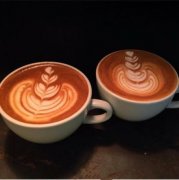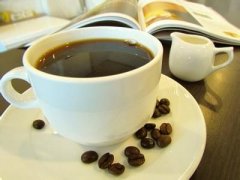To make an espresso, either rely on skill, or it will be a great test of kung fu.

The first time I tasted espresso was an interview in Geneva. When I first got off the plane, it was bright and sunny, but the interview was half an hour later, and everything was on the run. When I finally appeared in the interview room with a tired face, there were still five minutes to go before the interview began. The receptionist suggested a cup of coffee. All I knew was to say, "Yes!" Come on! "there is no need to explain.
But as soon as I regained my breath, the smell was immediately taken away by the aroma of a small cup of coffee. To tell you the truth, I was not in the mood to taste the taste of this cup of espresso, but drank it up like tequila. But it is really like tequila, draw a long line between the mouthpiece, quickly let the excited heat flow straight to the brain, back in the mouth for a long time.
Not long ago, when I arrived in Trieste, Italy, the birthplace of espresso, I didn't know what "espresso" means "cook it for you right away" in Italian. So espresso is the essence of coffee, must be boiled in order to make people realize its hot and strong, and its extended meaning is "for a special purpose, and the need for fast service", which also implies why every cup of espresso must be finished in a short time.
A calculating coffee machine
At the beginning of the last century, people came up with a way to pressurize the water in order to brew the coffee that guests need in a very short time. Francesco Illy, founder of Trieste-based illy Coffee, invented the first fully automatic espresso coffee machine, Illetta, in 1935, replacing the steam method with compressed air, an innovation that gradually changed the way the world enjoys coffee. Over the past century, three of the eight historic breakthroughs in the coffee industry have come from illy, including coffee machines, pressurized storage technology and coffee bags.
This strong coffee culture has a deep impact on Trieste. When you enter Trieste, you will strongly feel the rich coffee amorous feelings of this city. There are cafes all over the streets, open-air cafes everywhere, and Italians sitting under parasols from early morning to late at night. It is not difficult to find some historic cafes here, some of which have been open since the 19th century.
To make an espresso, either rely on skill, or it will be a great test of kung fu. Like Kungfu Tea, in addition to the nature of tea, there is also a sense of fighting, high-end fighting equipment, sophisticated fighting techniques, but also the ability to distinguish guests. The most humble espresso requires only a sturdy mocha pot. The water for making coffee is heated to the boiling point in a sealed pot, and the steam in the pot increases the pressure, using the steam to directly boil the coffee powder on the top. With the essence of steamed coffee, steam gathers on the top and becomes espresso. However, this method is due to the use of steam above the boiling point for a long time, improper heat will lead to "over-extraction", the bitterness and astringency will be extracted together, making the espresso taste scorched.
As a result, good espresso is difficult to make at home, and the more professional the better, the better the coffee machine to cook. Whether the pressure of the machine is big enough, the water circulation system is smooth enough, the handle or even the powder press is smooth enough, will affect the appearance of a cup of espresso.
I experienced the calculating coffee machine technology during a visit to the illy coffee factory. At first, 15 coffee beans are immediately ground into about 7 grams of coffee powder, all of which are poured into the filter spoon of the pressure bar. Then buckle the pressure bar at the outlet. Press the button and wait for the fine and thick coffee juice to ooze from the outlet. In order to prevent excessive extraction, the coffee cup must be removed after 25 seconds. The barista told me that although the process was simple, many of the details of the production were improved: the water temperature was 90 degrees Celsius, and a hand pressure bar was used to generate nine atmospheric pressures, resulting in a layer of amber grease exactly 3mm thick on the espresso cup noodles.
Important Notice :
前街咖啡 FrontStreet Coffee has moved to new addredd:
FrontStreet Coffee Address: 315,Donghua East Road,GuangZhou
Tel:020 38364473
- Prev

Coffee culture Taiwanese drink coffee as a habit
Xu Liyuan, a coffee expert, has been drinking coffee for decades. She is proficient in all kinds of coffee making methods. Recently, she was poached from Taiwan to Xiamen. She runs Mabele Roasting Cafe with two chain stores in Xiamen under desktop management. According to Xu Liyuan's experience, now that mainland residents have started their individual tours to Taiwan, if mainland friends come to Taiwan, they can go deep into Taiwan's various specialty coffees.
- Next

Describe my love for coffee in English
I like coffee so much that I have tea for breakfast: The first cup of the day in particular is so good that Im afraid I wont be able to properly appreciate it when I am half-asleep. Therefore, I celebrate it two hours later when I am fully
Related
- Beginners will see the "Coffee pull flower" guide!
- What is the difference between ice blog purified milk and ordinary milk coffee?
- Why is the Philippines the largest producer of crops in Liberia?
- For coffee extraction, should the fine powder be retained?
- How does extracted espresso fill pressed powder? How much strength does it take to press the powder?
- How to make jasmine cold extract coffee? Is the jasmine + latte good?
- Will this little toy really make the coffee taste better? How does Lily Drip affect coffee extraction?
- Will the action of slapping the filter cup also affect coffee extraction?
- What's the difference between powder-to-water ratio and powder-to-liquid ratio?
- What is the Ethiopian local species? What does it have to do with Heirloom native species?

